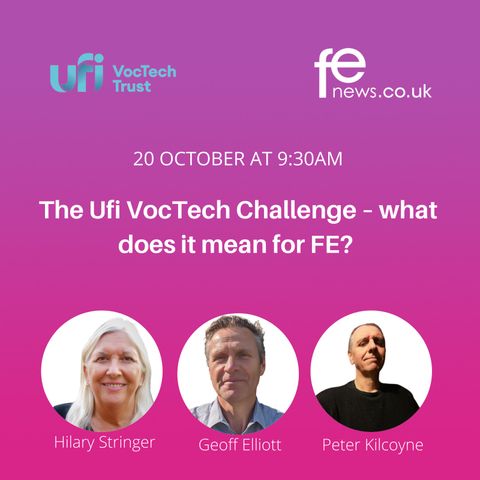The Ufi VocTech Challenge – what does it mean for FE? | #VocTechFutures Episode 3

Scarica e ascolta ovunque
Scarica i tuoi episodi preferiti e goditi l'ascolto, ovunque tu sia! Iscriviti o accedi ora per ascoltare offline.
Descrizione
Ufi VocTech Trust launched their VocTech Challenge White Paper in April, at the EdTech Summit, with a £2m commitment for grant funding, best practice sharing and sector partnerships to unlock...
mostra di piùThe initial “discovery phase” Challenge question to the FE community was “How can VocTech improve vocational outcomes for people most impacted by the digital divide and at greatest risk from the long-term impact of the pandemic on access to training and jobs? How do we then link those vocational skills to real employment opportunities?” A set of assumptions was published about the wider landscape Ufi had seen through their work during the pandemic and the desk research that they had undertaken. But the most important thing was to talk to people about their own lived experiences.
Ufi undertook three months of consultations with learners, employers, and education providers of all kinds, to try to uncover what the big issues were for them. Participants were asked, what, in their direct experience, were the underlying needs of learners and employers? How can VocTech help with these needs? How can VocTech improve vocational outcomes / the working lives of those who need it most? And what could Ufi, either alone or with partners, do to reduce the digital divide?
At the end of the process, a Green Paper was published focusing on the key findings:
There was a lack of access to both devices and bandwidth and alongside that, learning design was not tailored to the devices that people were able to access content on
Learners most at risk of digital exclusion have real issues of confidence and motivation which are real barriers to getting started and sticking with their learning
Digital skills barriers remain prevalent, but are more complex than might be expected – not all young people are digital natives and not all older people lack digital experience
It is particularly difficult to deliver practical skills remotely, and social aspects of learning need to be built into VocTech solutions
The VocTech market is still a difficult one to introduce innovations into, and there is a need for champions in the sector to take a risk and adopt new approaches
Ufi’s mission is around vocational skills, so they were not in a position to address all of these issues. A subsequent White Paper was published with responses to the consultation, including the VocTech Challenge funding call and activities in partnership with other key organisations in the sector to address some of the wider questions.
They are now in full flow delivering on the commitments made in the White Paper, but it’s important to Ufi to continue to explore the themes that were uncovered, to see what’s changing over time, so they are working on a ‘one year on’ analysis of what change they have been able to catalyse or support.
The VocTech Challenge funding call applications are currently in the process of being assessed to make sure that Ufi funds those that are addressing the issue of confidence and motivation within their target learner group – finding out what really works for those learners most at risk of remaining disadvantaged by the digital divide. Ufi are looking for projects that really engage with users to find out about their underlying needs and they know that these user groups can have complex needs to help them gain the skills they need for work.
But the VocTech Challenge is about more than Ufi’s grants and learner needs. As part of the Discovery Phase for their Challenge process, Ufi spoke with teachers and educators across the sector to see what issues they were facing. It was clear that problems of confidence and motivation also applied to those supporting learners as they grappled through 2020 to learn new skills and work remotely.
Ufi was well placed during the pandemic to fund a number of projects across the FE sector and private training providers to respond to the immediate needs of learners, and educators to keep delivering vocational skills in very difficult circumstances. As things are progressively returning to ‘normal’, Ufi is keen to see the VocTech that was adopted really embedded into daily usage, in a blended model or fully remote, depending on circumstances. And to champion what really good VocTech looks like, as an experience for staff and students.
Initiatives like AmplifyFE run by the Association for Learning Technology are helping to share that message of ‘what good looks like’ and embedding best practice, and the VocTeach team are gathering and developing resources to help take the strain out of finding good online content.
In this episode, Hilary Stringer, who co-ordinated the Challenge Discovery Phase will introduce guests Geoff Elliot, who worked at Pembrokeshire College and has led several Ufi funded projects and Peter Kilkoyne who is working with Pembrokeshire’s Audactive project – an innovative solution that enables teachers to create learning activities so learners can have a ‘conversation’ with coursework and avoid using a keyboard.
Informazioni
| Autore | FE News |
| Organizzazione | FE News |
| Sito | - |
| Tag |
Copyright 2024 - Spreaker Inc. an iHeartMedia Company

Commenti